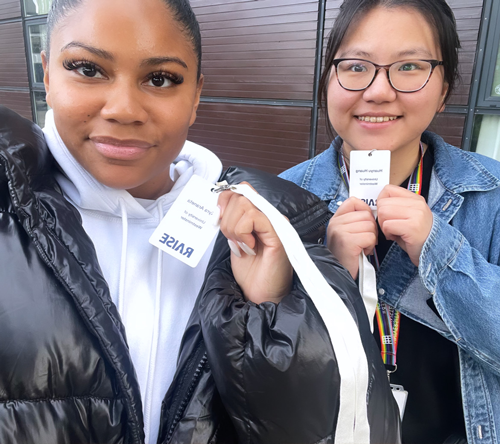Drawing upon a range of empirical, experiential, and socio-political perspectives the sessions aimed to promote critical engagement with race, identity and belonging at Westminster and sought to engage a range of critical perspectives to deepen understanding of the differential experiences of BME attainment within Higher Education.
Traditionally the language of the attainment gap has focused on underachievement or lack of attainment. These sessions sought to explore the ways in which institutional culture, curriculum, and pedagogy are fundamental to developing positive interventions for inclusive participation across the University.
As part of the seminar series on Critical Interventions in Higher Education the Centre for Teaching Innovation hosted the following events:
March and April 2018: BME Attainment Gap event –
Two events around the BME attainment gap at Westminster were offered.
The first event, ‘Strategic Perspectives: Rethinking the ‘Attainment Gap’ at Westminster’ provided an opportunity to understand the Westminster and the UK contexts around the attainment gap and consider strategic ways of addressing this issue. The event was held on Wednesday 7th March 14:00-17:00.
The second event, ‘The Human Library: Rethinking the ‘Attainment Gap’ at Westminster’ provided an opportunity to meet students at Westminster to discuss their experiences and to collaboratively discuss how we can address this at Westminster. The event was held on Wednesday 11th April 14:00-17:00.
February 2018 Ableism in the Curriculum –
What do we mean by ableism in the curriculum? What are the ethical and social considerations that we need to address to counter ableism in the curriculum? What would a curriculum that is not ableist be like? What are practical things that we can do in our classrooms that would move us toward a non-ableist curriculum?
Roundtable discussants included Nicole Brown (UCL Institute of Education), Sarah Golightley (University of Edinburgh), Fiona Kumari Campbell (University of Dundee), Rachel O’Brien (National Union of Students) and Becca-Grace Shrader (Westminster Students’ Union). The event was held on Friday 16 February 2018, 13:00-15:00 (Full details: http://cti.westminster.ac.uk/ableism-in-the-curriculum/)
The recordings and transcripts for the event are available to download. Transcripts are available in PDF and Word formats. The recordings and transcripts have been divided into separate parts for ease of access. If you have any questions about the recordings or the transcripts please contact Jennifer Fraser (j.fraser@westminster.ac.uk).
Introduction Ableism in the Curriculum(recording)
Introduction Ableism in the Curriculum (PDF transcript)
Introduction Ableism in the Curriculum (Word transcript)
Question 1 Ableism in the Curriculum (recording)
Question 1 Ableism in the Curriculum (PDF transcript)
Question 1 Ableism in the Curriculum (Word transcript)
Question 2 Ableism in the Curriculum (recording)
Question 2 Ableism in the Curriculum (PDF transcript)
Question 2 Ableism in the Curriculum (Word transcript)
Question 3 Ableism in the Curriculum (recording)
Question 3 Ableism in the Curriculum (PDF transcript)
Question 3 Ableism in the Curriculum (Word transcript)
Question 4 Ableism in the Curriculum(recording)
Question 4 Ableism in the Curriculum (PDF transcript)
Question 4 Ableism in the Curriculum (Word transcript)
Audience questions (recording – not available)
Audience questions Ableism in the Curriculum (PDF transcript)
Audience questions Ableism in the Curriculum (Word transcript)
Closing comments Ableism in the Curriculum (recording)
Closing comments Ableism in the Curriculum (PDF transcript)
Closing comments Ableism in the Curriculum (Word transcript)
December 2017 Fat Pedagogies in Practice –
In every classroom, norms and attitudes about bodies are (re)produced through both classroom dynamics (educator-student, student-student, student-educator) and the treatment of bodies within the subject material. Our bodies, and our students’ bodies play important roles in teaching and learning. Educators interested in issues of social justice must allow body size to have a place beside the commitment to issues of gender, race, ability, sexual orientation etc. In this seminar Dr Pausé explored ways that educators may include consideration of fat politics into the classroom. She presented strategies for incorporating critical pedagogies of the body into tertiary teaching with a focus on using social media as a social justice tool. This event was held on Monday December 4th, 3-5pm (full details: http://cti.westminster.ac.uk/fat-pedagogies-in-practice/)
Latest posts by fishere (see all)
- PROFESSIONAL RECOGNITION AND ENHANCEMENT SCHEME FOR TEACHING (PRESTige) - October 21, 2020
- PRESTige Inductory workshops - September 8, 2020
- Learning & Teaching Symposium 2020 - April 24, 2020





Leave A Comment